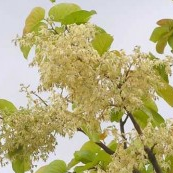
Shorea Robusta - Saal
This tree is native to the Indian subcontinent, ranging south of the Himalaya, from Myanmar in the east to Nepal, India and Bangladesh. In India, it extends from Assam, Bengal, Odisha and Jharkhand west to the Shivalik Hills in Haryana, east of the Yamuna. The range also extends through the Eastern Ghats and to the eastern Vindhya and Satpura ranges of central India. It is often the dominant tree in the forests where it occurs. In Nepal, it is found mostly in the terai region from east to west, especially, in the Churia range (the Shivalik Hill Churia Range) in the subtropical climate zone. There are many protected areas, such as Chitwan National Park, Bardia National Park and Shukla Phat National Park, where there are dense forests of huge sal trees. It is also found in the lower belt of the hilly region and inner terai.
Sal Tree is known as Shala in Ayurveda. Shala is an ancient Ayurvedic herb used for medicinal purposes. Its botanical name is Shorea robusta, it belongs to Dipterocarpaceae family . Its resin, bark, sap wood, oil etc are used for various therapeutic purposes.
Synonyms: Agnivallabha, Ashwakarna, Kanakalodhbava, kalyana, Kanta, Rala Niryasa, Vrischikara, Shalaniryasa, Sarjaniryasa, surabhi, Sarjarasa.
English name: Sal tree, Common Sal, Indian Dammer
Sal Tree in Hindi: Sakher, Sakhu, Sal, Shal
The shala is used in Ayurvedic medicine since thousands of centuries, sinec the time of Charaka and Sushruta.
Classical categorization:
Charaka samhita – Vedanasthapana (pain relieving), Kashaya skanda (astringent group of herbs)
Sushruta Samhita – Salasaradi Gana, Rodhradi Gana
Bhavaprakasha Nighantu – Vatadi Varga
Controversy and varieties:
The herb shala is known in many names, like Shala, Sarja – Copal tree resin – Vateria indica, Ashvakarna and Ajakarna.
At first, it was believed to be the same herb. But now, each of these herbs are recognized as different plants as follows.
Shala – Shorea robusta
Sarja – Copal tree resin – Vateria indica
Ashwakarna – Dipterocarpus alatus
Ajakarna – Shorea tumbuggaia
All the above yield resins. Overall, Shala , Rala and Shala niryasa refers to resin obtained from Shorea robusta and Sarja, Sarjarasa, Sarja Niryasa refers to – Copal tree resin – Vateria indica
Chemical constituents: Sal bark is used for tanning. Resin is composed for chemical slike hydroxyanone, dammarenediol II, Ursolic acid etc.
Medicinal properties
Taste: kashaya (astringent), madhura (sweet)
Guna (qualities) – Rooksha (dryness), Ushna (hot)
Veerya – hot potency
Vipaka – taste conversion after digestion – pungent
Rala – the resin of Shala herb is sweet, astringent, hot in nature, has anti-microbial properties,
Bhagnasandhanakrut – useful in fracture healing
Asra-dagdharuk – relieves pain due to wounds and burns.
Vishaha – anti-toxic,
Vranashodhana – cleanses wounds and quickens wound healing.
Part used: Bark, sap wood, heartwood, resin, oil, seeds, seed oil
FAQs:
What is the Return Policy?
This product is Not Returnable. It may be replaced or refunded in case of damage or defective condition on a case to case basis.
How to cancel my order?
Cancellation for Live Plants is allowed before the dispatched. You can request cancellation through Your Orders page or by contacting customer service within that time.
What if i received damage product?
If a product is received in a damaged or defective condition, you need to contact the customer service within 1 days of delivery. Free of cost replacement or refund claim is available to you.


